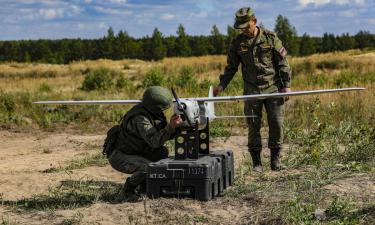Alfa–Bank's Shady Transactions
A large-scale fraud in the sum of several millions with participation
of Russia's largest banks has been disclosed
Agents of St.Petersburg Regional Federal Security Service Department have become frequent guests to Moscow's Alfa-Bank. The central office of the bank pretends it is happy to stay focused.They say, secretmachinations schemed by St.Petersburg officials of the bank could not have been disclosed without the Federal Security Service department from Russia's northern capital. To all appearances, the Moscow office of the bank decided to dismiss the management of the St.Petersburg bank branch after the visit of the investigators.
Officially, the St.Petersburg Federal Security Service department has no claims to Alfa-Bank so far. Instead, it has become recently known that legal proceedings have been instituted against the heads of two St.Petersburg companies, Regionkontrakt petrochemical company and Regionneftsnab fuel company on charges of swindling. According to materials of the investigation, since 2001, under the pretext of oil product supplies to different companies the businessmen stole over 150 million rubles. This sum looks insignificant as compared to the charges brought against Yukos shareholders. However, it is true that Russia may have no money for pensions and payments to children if each company in the country steals 150 million rubles.
Regionneftsnab fuel company is famous for the numerous law suits instituted by clients against the company. The suits are based on the failure of credits payment, misusage of other peoples' money and on charges of swindling. Websites of Russian regional courts publish just scanty reports on the scandalous proceedings, and Moscow is not informed about all the details.
At the same time, Russian press defines the management of the company as Russia's largest oil trader; Regionneftsnab Director General Sergey Grishanov explained that the company's rivals instituted the criminal proceedings. It seems that the rivals turn out to be very strong. At the end of 2002, Sergey Grishanov was put on a wanted list in the Russian Federation; he was detained later in December. The investigation department of the St.Petersburg Interior Ministry Department instituted criminal proceedings against the businessman on charges of large-scale swindling committed by an organized group.
Law enforcement authorities along with local authorities and regional companies that suffered from the company's activity have claims to Regionkontrakt petrochemical company. The company has let down many of its partners in Russia's regions.
In spite of its petrochemical name, Regionkontrakt has been involved in business of any sort if it dealt with national finance. Some time ago, the company was run by the state. Last year, the Nizhny Novgorod regional administration had to set up a special commission to investigate the fate of the budgetary loans appropriated for
Regionkontrakt to form the regional grain stock. The company was so much plunged in the grain stock formation that its debt to the regional budget increased to 131 million rubles by the end of 2001. By that very period, the assets of Regionkontrakt were less than 65 million rubles; some of the assets were mere bankrupt agricultural enterprises with the debt to Regionkontrakt at the rate of 53 million rubles.
The petrochemical company purchased grain from agricultural producers, hid it in granaries and expected for maximum grain prices. Meanwhile, the region had to buy grain outside the region. Finally, the grain was sold under price. This is hardly likely that the attitude is mere negligence and carelessness. Deputies of the regional legislative assembly understood that there was some other party that considerably profited from the absurd business.
However, Regionkontrakt became particularly infamous when it was charged with supplying agricultural producers in Russia's Ulyanovsk Region with diesel oil and combustive-lubricating materials for sowing. The Ulyanovsk Region experienced the deficit of combustive-lubricating materials for sowing in 1999; the deficit could have caused the damage of about 190 million rubles. Ulyanovsknefteprodukt, the key fuel producer, threatened to suspend fuel supply and demanded that the regional authorities must settle the debt for the previously supplied fuel. But the regional administration had no money although it had received a privileged loan from the RF Agriculture Ministry some time before. It was Regionkontrakt that helped spend the money appropriated by the ministry.
In May 1999, Ulyanovsk Governor Yury Goryachev allowed Regionkontrakt to borrow loans to the sum of 13 and 13.5 million rubles at the interest of 12 per cent from Alfa-Bank, the special agent of the government at that period. The money was meant for purchase of combustive-lubricating materials. That was the money appropriated by the Agriculture Ministry and allocated through the bank. Alfa-Bank
gave the loans to Regionkontrakt. But the bank appropriated the loan for purchase of Alfa-Bank loan notes, not for purchase of combustive-lubricating materials. It was allegedly declared that the loan notes of Moscow's Alfa-Bank could be successfully used for purchase of fuel for agricultural producers.
Next day, the committee for regional food fund received the loan notes and cashed them in Alfa-Bank. Money paid for the loan notes made up 10 million rubles instead of the nominal of 13 million rubles because the papers were presented for payment before the date fixed in the notes (a 3-months period). The bank withheld the discount of 3 million rubles as a penalty for violation of the bill terms.
Next week, Regionkontrakt borrowed another credit to the sum of 13.5 million rubles from Alfa-Bank. This time the bank appropriated finance to fill in for 13-million commercial loan given to Regionkontrakt five days before. With the money, regional administration officials purchased loan notes from Alfa-Bank and then sold them back to the bank.
According to an agreement concluded between the RF Agriculture Ministry and Alfa-Bank, money of a special fund for Regionkontrakt's privileged crediting could be received by the agent bank only upon presenting documents proving that a privileged loan had been registered by some recipient. By approbation of the governor, the recipient managed to borrow the loan earlier. As a result, the money
was received and stayed in the bank thus covering the previous debt of the Ulyanovsk Region. It was the sum with which Alfa-Bank highly likely paid 10 million rubles for the loan notes bought back from Regionkontrakt; thanks to the operation, the bank earned 3 million rubles of the discount and 500 thousand rubles as the interest for the previous commercial loan.
The bank employed the same scheme while appropriating a loan to the sum of 19 million rubles in July 1999 and several times later.
As a result, the figures involved in the machination were as following: the federal special fund, the agent bank and Regionkontrakt. The mutual debts and loans of each made up 32.5 million rubles. However, the sum remained stable only for the federal budget. Alfa-Bank received a discount to the sum of 7.5 million rubles from nowhere, the interest from the loans and retained the right to claim payment of the privileged loan given to Regionkontrakt and to impose penalties in case the money was not paid according to the loan terms. When Alfa-Bank received no money it appealed to the Arbitration Court to recover the sum of 41.3 million rubles from the regional administration that acted as a guarantor and from Regionkontrakt. The court supported the claims. The regional administration had to pay. This seems to be wonderful profit for crediting the RF units.
Machinations of the same sort were done in 1997, 1998, 2000 and 2001. In addition to the bank accounts stipulated by the law, the Ulyanovsk regional administration used accounts in Alfa-Bank, Menatep-Moscow and other commercial banks to perform machinations with money appropriated by the government for sowing. The RF Accounts Chamber examined the machinations; information about the transactions is available on the websites of the Accounts Chamber and at the RF Supreme Arbitration Court. This is the scheme of machinations done just in one of Russia's 89 subjects and of one bank.
It is not ruled out that St.Petersburg department of the Federal Security Service and RF Prosecutor's Office have a different opinion of this "method" of business management. This means that more changes may still take place in the Alfa-Bank management. The investigation thinks that some officials of Alfa-Bank's bank branch in St.Petersburg acted in collusion with some officials in the Moscow office of the bank.
Akhtyam Akhtyrov
PRAVDA.Ru
Subscribe to Pravda.Ru Telegram channel, Facebook, RSS!





